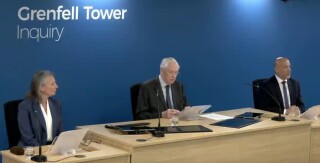Lying and cheating by construction products manufacturers was a core factor in the deaths of 72 people from the Grenfell Tower fire in 2017.
The manufacturers were abetted by incompetent product certification bodies.
The solution, the official inquiry has concluded, is total state intervention, taking over the whole certification process out of the commercial sector and making it a function of government.
The final report of the inquiry calls for the creation of a Construction Regulator, with much wider responsibilities than those given to the recently created Building Safety Regulator.
The report recommends that the Construction Regulator be given responsibility for
- the regulation of construction products
- the development of suitable methods for testing the reaction to fire of materials and products intended for use in construction
- the testing and certification of such products
- the issue of certificates of compliance of construction products with the requirements of legislation, statutory guidance and industry standards
- the regulation and oversight of building control
- introduction of a licensing scheme for contractors to work on higher-risk buildings
- monitoring the operation of the Building Regulations and the statutory guidance and advising the Secretary of State on the need for change
- carrying out research on matters affecting fire safety in the built environment
- collecting information, both in the UK and abroad, on matters affecting fire safety
- exchanging information with the fire and rescue services on matters affecting fire safety
- accrediting fire risk assessors
- maintaining a publicly available library of test data and publications.
Here is what the inquiry report says:
“It is essential that those responsible for designing buildings have access to reliable information about the materials and products they wish to use. In their product literature manufacturers make many claims for their products, some of which are not of an overtly technical nature but are calculated to give the impression that a particular product has passed a particular test or has been shown to be suitable for a particular use. That was one of the marketing devices employed by those who manufactured and sold the rainscreen cladding panels and the insulation used in the refurbishment of Grenfell Tower.
“Manufacturers were able to use misleading marketing material in part because the certification bodies that provided assurance to the market of the quality and characteristics of the products failed to ensure that the statements in the certificates they issued were accurate and based on appropriate and relevant test evidence. The United Kingdom Assessment Service (UKAS), the organisation charged with accrediting them, failed to apply proper standards of monitoring and supervision. The fact that three separate manufacturers were able to obtain misleading certificates relating to their products is evidence of a serious failure of the system and points to a need for a different approach to the certification of construction products.

“We do not think that the appointment of a National Regulator of Construction Products will solve the problem [ –the Office for Product Safety & Standards (OPSS) is the current UK regulator for construction products and most consumer goods – ] because the system will still depend on the effectiveness of the conformity assessment bodies and the limited oversight of UKAS. Conformity assessment bodies provide a commercial service combined with an element of regulation, but the two functions do not sit easily together. Pressure to acquire and retain customers can all too easily lead such bodies to be less rigorous in their examination of products and materials and enforcing their terms of contracts than could reasonably be expected of bodies acting in the public interest.
“We therefore recommend that the Construction Regulator should be responsible for assessing the conformity of construction products with the requirements of legislation, statutory guidance and industry standards and issuing certificates as appropriate. We should expect such certificates to become pre-eminent in the market.”

The report also recommends that government address the fragmentation of its own responsibilities for regulating fire safety in the construction industry, which is currently spread across the Ministry of Housing, the Home Office and the Department for Business & Trade.
It recommends a single body responsible for all aspects of regulating matters affecting fire safety in the construction industry, reporting to a single secretary of state, answerable to parliament for all aspects of fire safety.
Other recommendations include the secretary of state reinstating the position of Chief Construction Adviser (which was created in 2009 but abolished in 2015), only this time with a sufficient budget and staff to provide advice on all matters affecting the construction industry.
The inquiry also recommends revisions to Approved Document B, the building regulation in England covering fire safety matters within and around buildings. Ambiguity over its status appears to have been a factor in the choice of cladding for the notorious 2015 Grenfell Tower refurbishment.
“We do not think that Approved Document B provides the information needed to design buildings that are safe in fire,” the report says. “Approved Document B needs to be reviewed as a matter of urgency… It must then be kept under continuous review, together with the other Approved Documents, and amended annually or promptly whenever developments in materials or building methods make that desirable. It should be drafted conservatively to ensure, as far as possible, that compliance with it will provide a high degree of confidence that on completion of the work the building will comply with the Building Regulations.”
Got a story? Email news@theconstructionindex.co.uk



